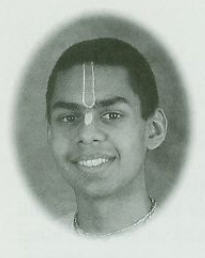
Ravi Gupta
A NEW INDIAN GUEST at a recent Sunday feast at our center here in Boise, Idaho, remarked, "Oh yes, I know about the Hare Krsna philosophy. It's a simplified, sentimental process of chanting and dancing." Many Indians have the misconception that Krsna consciousness is a sentimental process meant for the less intelligent, or for those not inclined toward philosophical study. These Indians think that for foreigners, who might have a problem performing austerity or understanding philosophy, Srila Prabhupada simplified traditional Vedic practices.
This misconception is not new. Five hundred years ago, Prakasananda Sarasvati, a renowned Mayavadi scholar of Benares, similarly criticized Lord Caitanya, calling him a bhavuka, or "sentimentalist": "Although asannyasi, He does not take interest in the study of Vedanta but instead always engages in chanting and dancing and sankirtana. This Caitanya Mahaprabhu is an illiterate sannyasi and does not know His real function. Guided only by His sentiments, He wanders about in the company of other sentimentalists." (Caitanya-caritamrta, Adi-lila 7.41-42)
True, the process for attaining the Lord in this age, Kali-yuga, is simplified. Previous ages required great fire sacrifices, elaborate Deity worship, or meditation for thousands of years. In Kali-yuga we don't have the life span, the pure atmosphere, or the power of concentration needed for meditation, nor do we have the qualified brahmanas and great amounts of ghee and gold required for fire sacrifices and elaborate Deity worship. The present age is rampant with materialism and ridden with faults. Therefore the relatively simple process to achieve Krsna consciousness is the chanting of Krsna's holy names.
Although simple to perform, chanting the Lord's names is not sentimental fanaticism meant for unintelligent people. It is, in fact, the highest of all spiritual processes. As Lord Krsna says in the Bhagavad-gita (15.15),vedais ca sarvair aham eva vedyah: "By all the Vedas I am to be known." And how can we know Krsna? "By practicing yoga in full consciousness of Me [Krsna consciousness], with mind attached to Me, you can know Me in full, free from doubt." (Bg. 7.1) There's no better way to be conscious of Krsna than to chant His holy names.
satatam kirtayanto mam
yatantas ca drdha-vratah
namasyantas ca mam bhaktya
nitya-yukta upasate
"Always chanting My glories, endeavoring with great determination, bowing down before Me, these great souls [mahatmas] perpetually worship Me with devotion." (Bg. 9.14) For the great souls, Lord Krsna destroys "with the shining lamp of knowledge the darkness born of ignorance." (Bg. 10.11)
So it is the devotee who actually knows the import of all the Vedic scriptures. He is the topmost spiritualist, because he has understood Krsna Himself as the goal of all knowledge, penance, sacrifice, and renunciation.
The devotee's chanting is based on sastra, scripture, and is firmly grounded in knowledge of the Absolute Truth. Sri Caitanya Mahaprabhu easily defeated Prakasananda Sarasvati in philosophical debate and explained the true meaning of Vedanta to him. The six Gosvamis of Vrndavana wrote a library full of philosophical treatises in Sanskrit. Srila Baladeva Vidyabhusana, a later follower of Lord Caitanya's, wrote Govinda-bhasya, an erudite commentary on the Vedanta-sutra. And in our own times, Srila Prabhupada translated many Vedic books into English. He based his entire movement on these books and wanted his followers to read them daily.
In fact, Srila Prabhupada criticized those who simply make a sentimental show of love of God, without any knowledge of scriptural rules and regulations. Such people are called sahajiyas, or imitators. Their chanting and dancing have no value.
Srila Prabhupada writes, "Religion without philosophy is sentiment, or sometimes fanaticism, while philosophy without religion is mental speculation." A Krsna conscious person has both knowledge and devotion.
Ravi Gupta, age fifteen, lives at the Hare Krsna center in Boise, Idaho, USA. The center is run by his parents. Ravi, who was schooled at home, is a third-year student at Boise State University.
